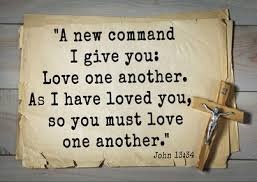
Acts 14:21b-27; Psalm 145; Revelation 21:1-5a; JOHN 13:31-33a;34-35
When Judas had gone out [from the upper room] Jesus said, ‘Now is the Son of man glorified and in him God is glorified’. These words we have just read must be among the most startling words in the New Testament. Just before this, of course, Jesus – knowing that his hour had come – had washed the feet of his disciples. And immediately, it says, he was deeply disturbed and declared, ‘one of you is going to betray me.’ When they asked Who is it, Lord?, Jesus dipped a piece of the common bread into the dish and gave it to Judas. And, at that instant, after Judas had taken the bread, Satan entered him. Satan entered him. Satan, the enemy of mankind, the lord of darkness: Satan entered the heart of one of Jesus’s closest friends and he determined to betray him. This is the end, the final betrayal: Jesus is doomed, as good as dead. Everything is now lost, and Satan the betrayer is among them, in the upper room itself. And yet this is the moment when Jesus says, Now is the Son of man glorified. Glorified? Filled with glory. What could he have meant? What does it mean for us?
When Judas had gone out [from the upper room] Jesus said, ‘Now is the Son of man glorified and in him God is glorified’. These words we have just read must be among the most startling words in the New Testament. Just before this, of course, Jesus – knowing that his hour had come – had washed the feet of his disciples. And immediately, it says, he was deeply disturbed and declared, ‘one of you is going to betray me.’ When they asked Who is it, Lord?, Jesus dipped a piece of the common bread into the dish and gave it to Judas. And, at that instant, after Judas had taken the bread, Satan entered him. Satan entered him. Satan, the enemy of mankind, the lord of darkness: Satan entered the heart of one of Jesus’s closest friends and he determined to betray him. This is the end, the final betrayal: Jesus is doomed, as good as dead. Everything is now lost, and Satan the betrayer is among them, in the upper room itself. And yet this is the moment when Jesus says, Now is the Son of man glorified. Glorified? Filled with glory. What could he have meant? What does it mean for us?
What actually came, of course, was not that wretched end at all. What happened was that the disciples, far from being scattered by the disaster of Jesus’s death, found themselves being drawn closer together – whether to comfort each other or cling to each other in fear. And they found that, being together, something inexplicable happened: the stone rejected by the builder, as Jesus prophesied that day in the Temple, had become the cornerstone. Gathering around the death of Jesus, they found that, in fact, it brought them not despair but even, somehow, hope. This death, with suffering but without fear, brought them something new: even, they began to see, a whole new kind of life. The moment of birth – or perhaps of conception – and the moment of death: these are the two times in our lives when we know ourselves most completely in the hands of God, our creator.
The disciples began to see that death not, after all, as the last enemy to be feared. Birth and death are not so different, or so frightening, after all. What was there, in fact, to be feared? After all, the very worst thing imaginable had already happened! Satan had triumphed through our betrayal, our saviour had died on the cross. All that had happened. And yet, and yet – the freedom and joy that comes from witnessing the overcoming of death and of the fear of death! It’s the freedom to live and to love, to live life and give life even as far as death itself. For suddenly death, now, is no longer an enemy but a friend, an old friend: for are we all not in any case always in the hands of God, whether we know it or not? Death – death lived as Jesus lived his own death – is really a new kind of birth, or perhaps a continuation of birth.
The disciples began to see that death not, after all, as the last enemy to be feared. Birth and death are not so different, or so frightening, after all. What was there, in fact, to be feared? After all, the very worst thing imaginable had already happened! Satan had triumphed through our betrayal, our saviour had died on the cross. All that had happened. And yet, and yet – the freedom and joy that comes from witnessing the overcoming of death and of the fear of death! It’s the freedom to live and to love, to live life and give life even as far as death itself. For suddenly death, now, is no longer an enemy but a friend, an old friend: for are we all not in any case always in the hands of God, whether we know it or not? Death – death lived as Jesus lived his own death – is really a new kind of birth, or perhaps a continuation of birth.
All of us who know what it is to be afraid – and I suppose that is all of us – whether of embarrassment or the disapproval and condemnation of others, or of failure, isolation or suffering, of the past or the future, of life or even of death itself: all of us, we also know in our hearts what it is or would be like to be free, totally free – free to respond fully and generously, free to spend our own lives, which are so brief when seen against the vastness of eternity, for the sake of others. May the Lord bless and bring to fruition his words in our hearts, through Christ our Lord.
Stephen Buckland SJ
In Chapel of the Holy Name, Arrupe Jesuit University
Arrupe Jesuit University, Harare, Zimbabwe
